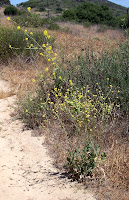 Let me make one thing perfectly clear: I hate mustard. It's the worst weed in my home's environment, by far. There are two common species in my yard, so far as I can tell: black mustard (brassica nigra) and shortpod/mediterranean/hoary mustard (hirschfeldia incana). See this very useful mustard page, from which I shamelessly stole this photo. The photo at right shows both species growing side-by-side, with the h. incana in the foreground.
Let me make one thing perfectly clear: I hate mustard. It's the worst weed in my home's environment, by far. There are two common species in my yard, so far as I can tell: black mustard (brassica nigra) and shortpod/mediterranean/hoary mustard (hirschfeldia incana). See this very useful mustard page, from which I shamelessly stole this photo. The photo at right shows both species growing side-by-side, with the h. incana in the foreground.
My mustard hatred is particularly keen at the moment, as I've just come back inside after battling the umpteen million plants in my yard. My current method is very hard work, but quite satisfying, as the mustard plants are mechanically chopped from the ground, pieces flying in all directions. I'm using the top-end Husqvarna weed-whacker, fitted with a three-toothed steel blade (that wimpy plastic cord doesn't work on mustard!). It's quite powerful, with (I believe) a 2.5 horsepower gasoline engine. What makes it hard work is that (a) you have to dig the rotating blade into the ground to get all the leaves chopped off (particularly for the h. incana plants), and (b) it's 90 degrees plus outside. Over the last two mornings, before it got too darned hot, I cleared about an acre and a half of these disgusting, hideous, obnoxious things.
That's the good news. The bad news is that past experience suggests to me that they'll be back, as strong as ever, within a week or two. The mechanical removal method — while satisfying — isn't really very practical, it seems. So this morning I set out to investigate herbicides.
And I discovered almost nothing in the way of advice on what kind of herbicide to use on mustard. I did find a few articles about "broad spectrum" versus "broadleaf" weed killers, but it's not 100% clear to me whether mustard is or is not considered a broadleaf. There was a lot of discussion about h. incana (in particular) and genetic modification; apparently it easily hybridizes with some crops (especialy rapeseed), creating the danger of spreading herbicide-resistance genes to the same species we're trying to control.
So...I'm off to Home Depot to see if they carry any herbicide that specifically targets mustards. I'm not particularly optimistic about this, as I'm beginning to believe that mustard is the one plant that's likely to survive anything up to and including a nuclear holocaust...
As usual, click the photo for a larger view.

